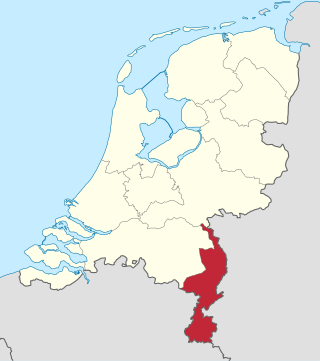
Limburg, also known as Dutch Limburg, is the southernmost of the twelve provinces of the Netherlands. It is bordered by Gelderland to the north and by North Brabant to its west. Its long eastern boundary forms the international border with the state of North Rhine-Westphalia in Germany. To the west is the international border with the similarly named Belgian province of Limburg, part of which is delineated by the river Meuse. To the south, Limburg is bordered by the Belgian province of Liège. The Vaalserberg is on the extreme southeastern point, marking the tripoint of the Netherlands, Germany and Belgium.

Roermond is a city, municipality, and diocese in the Limburg province of the Netherlands. Roermond is a historically important town on the lower Roer on the east bank of the river Meuse. It received town rights in 1231. Roermond's town centre has become a designated conservation area.

Education in Indonesia falls under the responsibility of the Ministry of Education, Culture, Research, and Technology and the Ministry of Religious Affairs. In Indonesia, all citizens must undertake twelve years of compulsory education which consists of six years at elementary level and three each at middle and high school levels. Islamic, Christian, Hinduism, Buddhist and Confucianism schools are under the responsibility of the Ministry of Religious Affairs.

Sri Sultan Hamengkubuwono IX, often abbreviated as HB IX, was an Indonesian politician and Javanese royal who was the second vice president of Indonesia, the ninth sultan of Yogyakarta, and the first governor of the Special Region of Yogyakarta. Hamengkubuwono IX was also the chairman of the first National Scout Movement Quarter and was known as the Father of the Indonesian Scouts.
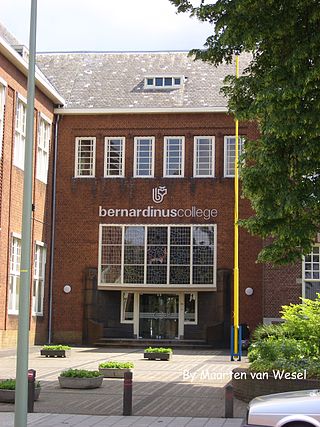
Bernardinuscollege is a school in Heerlen, the Netherlands. The school was founded by Franciscan friars in 1903 as a monastery, that was later converted to a Hogere Burgerschool, because of the need for education in the wake of the blooming mining industry. In September 1913 the first students arrived.

Gerungan Saul Samuel Jacob Ratulangi, known as Sam Ratulangi, was a Minahasan teacher, journalist, politician, and national hero from North Sulawesi, Indonesia. He was part of the committee that ratified the Constitution of Indonesia and served as the first Governor of Sulawesi.
Willem Frederik Gisolf was a Dutch geologist and petrographer who worked and taught in Bogor, Dutch East Indies.
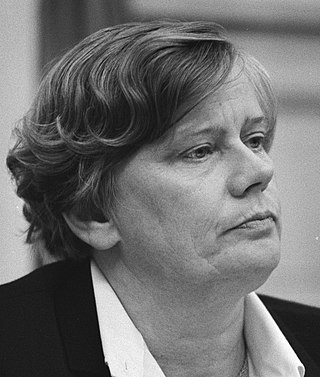
Catharina Isabella "Ien" Dales was a Dutch politician and social worker. Born in Arnhem, she received a degree in education from the University of Amsterdam and worked in social services before her career in politics. She became a member of the Labour Party (PvdA) in 1968 and was appointed State Secretary for Social Affairs and Employment in the Van Agt II cabinet, a position that she held between 1981 and 1982. Dales was a member of the House of Representatives between 1981 and 1987 and mayor of Nijmegen between 1987 and 1989. She was the Minister of the Interior in the Lubbers III cabinet from 1989 and 1994.
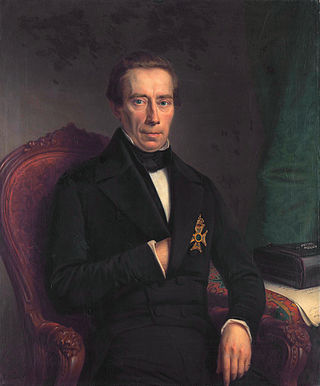
Johan Rudolph Thorbecke was a Dutch liberal statesman, one of the most important Dutch politicians of the 19th century. Thorbecke is best known for heading the commission that drafted the revision of the Constitution of the Netherlands in 1848, amidst the liberal democratic revolutions of 1848. The new constitution transformed the country from an absolute monarchy into a constitutional monarchy, with the States General and the Council of Ministers becoming more powerful than the king. The amended constitution also granted individual rights to residents and citizens of the kingdom. This made the constitution one of the more progressive at the time. Thorbecke is generally considered a founding father of the modern political system of the Netherlands.

The Hoogere Burger School is a former HBS Hogere burgerschool on the Zijlvest, Haarlem, The Netherlands. It was one of the oldest public schools in Haarlem, moved from the Jacobijnestraat and built as a boys school in 1906. It has been converted into apartments.

Albert Vogel was a Dutch officer, teacher and performer.

Lyceum Schöndeln is a secondary school in Roermond, Netherlands. It combines a havo, an atheneum and a gymnasium and incorporates specialisations in both the arts (cultuurprofielschool) and the exact sciences (technasium). The school was formed in 2007 from the merger of the Stedelijk Lyceum and the Bisschoppelijk College Schöndeln.
Loa Sek Hie Sia was a colonial Indonesian politician, parliamentarian and the founding Voorzitter or chairman of the controversial, ethnic-Chinese self-defense force Pao An Tui (1946–1949). He was a Peranakan of Chinese-Indonesian, Austrian and Javanese descent. In his political career, he campaigned against racial discrimination and demanded better healthcare and education for ethnic Chinese in the Dutch East Indies.
The following is a timeline of the history of the municipality of Maastricht, Netherlands.
Jacob Hiegentlich was a gay Dutch poet of Jewish descent. He committed suicide in 1940, at age 33, days after the German invasion of the Netherlands.
Han Tiauw Tjong Sia (1894–1940), known as Dr. Ir. Han Tiauw Tjong, was a prominent colonial Indonesian politician, engineer, community leader and a member of the influential Han family of Lasem. He sat in the Volksraad of the Dutch East Indies for two terms, and was a founding member of the centre-right political party Chung Hwa Hui. Han also served as a Trustee of the Technische Hoogeschool te Bandoeng from 1924 until 1940.

Joseph William Julian was an English football manager. After his playing career was cut short by injury, he became known for his lengthy stint managing clubs in the Netherlands, including Feyenoord, NAC Breda, NEC, MVV Maastricht and Willem II, among others.
Sijfert Hendrik Koorders was a Dutch botanist, who worked primarily on the flora of Java.
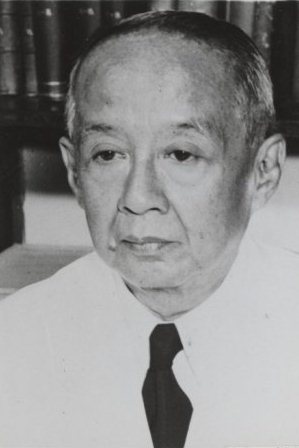
Husein Jayadiningrat, or Hoesein Djajadiningrat in older spelling, was an Indonesian scholar in Indonesian studies, Islamic law, and native Indonesian literature. He distinguished himself as one of the first native Indonesian to earn a doctoral degree.
Pierre Heijboer was a Dutch journalist.














